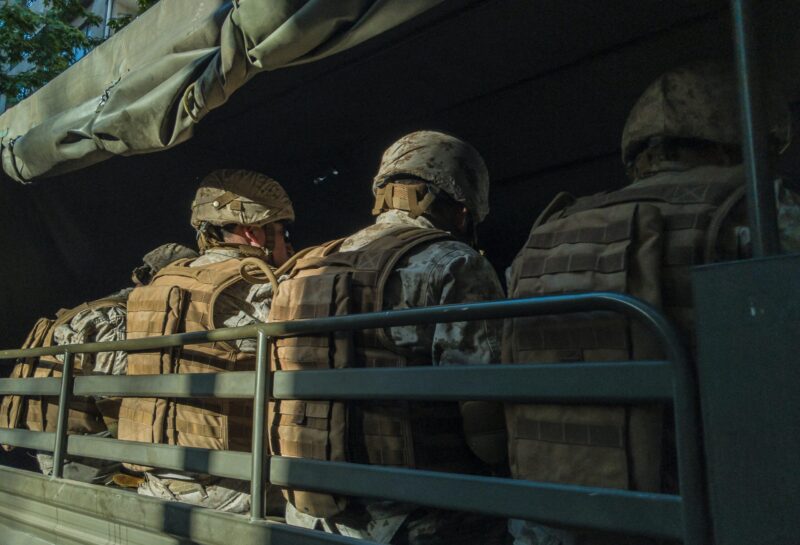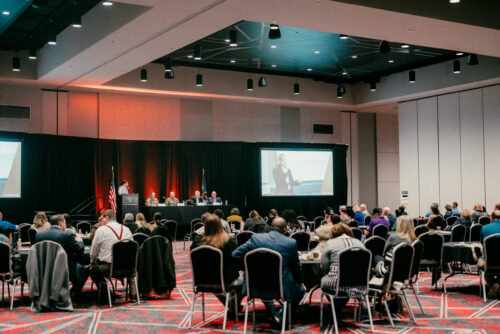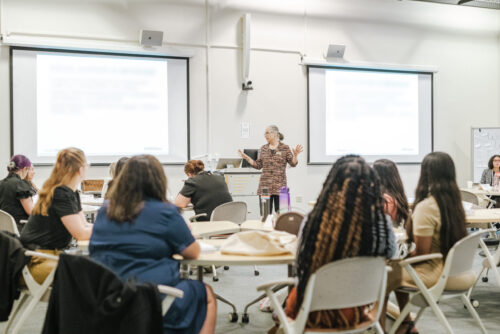Purdue Military Family Research Institute takes giant leaps to support military and veteran families
Written By: Rebecca Hoffa, rhoffa@purdue.edu

From helping women student veterans find support and success in college to connecting military and veteran families with mental health resources, Purdue University’s Military Family Research Institute (MFRI) has enhanced the well-being of countless military and veteran families since its start in 2000 through its research and outreach activities.
Housed in the Department of Human Development and Family Science within the College of Health and Human Sciences, MFRI works to shape policies, programs and practices to help military and veteran families connect with the resources they need and the benefits they have earned. Because social services and governmental systems can be complex, MFRI serves as an intermediary to strengthen military and civilian infrastructures and help them work more efficiently for military families.
“We look for ways to be the linking mechanism that helps systems to work better around families, and if you look across everything that we do, I think you’ll see that as a common theme,” said Shelley MacDermid Wadsworth, MFRI director and distinguished professor in the Department of Human Development and Family Science. “So often families will say they need something, or they tried to find something, and those of us who have been in those systems longer know that thing exists, but somehow, it never found them, or they never found it. That always seems like a tragedy.”
MFRI originated from a collaboration between MacDermid Wadsworth; the late Howard Weiss, a former professor emeritus in Purdue’s Department of Psychological Sciences; and Steve Green, Basil S. Turner Distinguished Professor Emeritus of Management. The three faculty members worked on a Department of Defense grant proposal that aimed to create a research institute devoted to military families. Because of Purdue’s existing foundation of family research, outreach and policy-relevant work in the Center for Families as well as the interdisciplinary excellence of the scientific team, their proposal won the competition, and work began on developing MFRI.

Individuals gather for the Battlemind to Home Summit, the annual conference held by the Military Family Research Institute.(Photo provided by MFRI)
MacDermid Wadsworth and Weiss became co-directors of MFRI, and its founding mission was to conduct policy-relevant research for the Office of Military Community and Family Policy. Part of the Office of the Secretary of Defense, the office guides policies, programs and practices across all branches of military service.
“All of the things that MFRI has done are ripples from that early action,” MacDermid Wadsworth said. “Twenty-five years later, it’s become a very big set of ripples that have gone much farther, I think, than we ever dreamed.”
In 2007, MacDermid Wadsworth was contacted by Lilly Endowment about an opportunity to assist with helping families of service members who were being deployed to the Middle East. MFRI received its first grant from Lilly Endowment that year and has received six others since. The most recent $5 million grant, which includes a matching component for funds raised by charitable giving, was awarded in March and will run through 2026.
“They have been very steadfast in the priority that they give to military families and have been very supportive of the work we are trying to do,” MacDermid Wadsworth said. “We work hard to act in ways that are consistent with the values they have demonstrated in their commitment to Indiana. It continues to be a wonderful partnership — we’re so grateful.”
MFRI’s projects have evolved over time as the needs of military families have evolved, allowing the institute to provide support where it’s needed most. The institute focuses on the major areas that affect military families, including behavioral health, education, policy and more.
MFRI’s longest-running and most widely available program, which is projected to be in all U.S. states by the end of 2025, is Star Behavioral Health Providers. This program helps connect service members, veterans and their families with trained community-based therapists to close the gap to mental health treatment and is conducted in partnership with the Center for Deployment Psychology at the Uniformed Services University of the Health Sciences.
The institute also has other direct impacts in communities through its Reaching Rural Veterans program, which helps veterans in need connect with resources, from basic needs to health care to employment assistance and beyond. The program has made strides in addressing some of the unique challenges faced by rural veterans, such as food insecurity.

Shelley MacDermid Wadsworth (center) addresses women attending the Focus Forward Fellowship. (Photo provided by MFRI)
In the academic landscape, the Focus Forward Fellowship empowers women veterans pursuing a college degree with the skills and networks needed to succeed in higher education. The program has helped more than 130 women student veterans succeed since its start in 2016.
The center also takes a broader approach to helping military families through its Measuring Communities project, which provides military- and veteran-specific data on topics such as employment, demographics, housing, behavioral health and more. This helps to inform communities about gaps in their local services and allows them to strengthen their efforts.
“With each domain that we look at, we try to think about: What is the gap? Can we see a way to try to close the gap? Does this institute have the skills and ability to accomplish whatever that task is? If yes, then we give it a try,” MacDermid Wadsworth said.
In addition to its external collaborations, MFRI has developed a variety of partnerships and collaborations across Purdue as they work to enhance the lives of military families. They have also expanded opportunities for Purdue students to get involved in the center through internships and research positions.
“My journey working with MFRI began in 2016 with the inception of Measuring Communities,” said Benjamin St. Germain, GIS analyst at Purdue’s Center for Regional Development. “The experience has been marked by dedication, mutual growth and an unwavering commitment to making a meaningful impact. MFRI plays a vital role in supporting and empowering military families in the valuable research, resources, and services it provides.”
The generous contributions of alumni and friends have continued to help MFRI take giant leaps to support military families. Learn more about opportunities to support MFRI or make a gift.
Discover more from News | College of Health and Human Sciences
Subscribe to get the latest posts sent to your email.